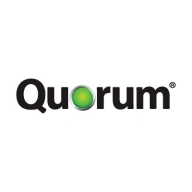

Microsoft DPM and Quorum OnQ operate in the data protection and disaster recovery market. Quorum OnQ has an edge due to its advanced features, making it a preferred choice despite higher costs.
Features: Microsoft DPM provides scalable data protection with seamless Microsoft service integration, reliable data recovery, and efficient backup solutions. Quorum OnQ offers instant recovery, automatic testing, and integrated recovery assurance, focusing on speed and integration for robust recovery.
Room for Improvement: Microsoft DPM could improve its disaster recovery speed and modernize its interface. It can also enhance non-Microsoft environment compatibility. Quorum OnQ could benefit from reducing initial setup costs, expanding documentation for wider scenarios, and adding more customization in its recovery features.
Ease of Deployment and Customer Service: Microsoft DPM deployment is simplified within Microsoft environments, supported by comprehensive documentation. Quorum OnQ allows faster deployment due to its appliance-based model and provides personalized support beyond initial setup, emphasizing a streamlined process.
Pricing and ROI: Microsoft DPM is cost-effective with a lower initial setup cost and benefits for enterprises using Microsoft infrastructure. Quorum OnQ, despite a higher initial cost, offers superior ROI by minimizing downtime through advanced recovery capabilities. The key difference is Quorum's focus on long-term ROI versus Microsoft's cost-effective integration.
They provide professional services that are quite good and can meet your needs.
The product is very stable, rating between eight and nine out of ten.
The backup should have compression, deduplication, and DR replication.
Microsoft DPM could improve by adding S3 backup to S3 storage capabilities.
The URL for our environments is the same, making it confusing for management when handling different departments with different needs.
Microsoft licensing is complex, especially for enterprise or data center solutions.
The pricing of Microsoft solutions rates in the middle range at five out of ten.
It's a little expensive.
Microsoft DPM impacted my organization positively, and that was definitely possible.
The two-layer backup system is a particularly valuable feature in Microsoft DPM.
One of the most effective features of Microsoft DPM is its integration with the entire Microsoft ecosystem.
Quorum OnQ provides an elevated ability to filter on everything from people's location to age to their voting history.
| Product | Market Share (%) |
|---|---|
| Microsoft DPM | 0.9% |
| Quorum OnQ | 0.7% |
| Other | 98.4% |

| Company Size | Count |
|---|---|
| Small Business | 9 |
| Midsize Enterprise | 7 |
| Large Enterprise | 7 |
| Company Size | Count |
|---|---|
| Small Business | 19 |
| Large Enterprise | 4 |
Microsoft Data Protection Manager (DPM) is an enterprise backup system that can be used to back up data from a source location to a target secondary location. Microsoft DPM allows you to back up application data from Microsoft servers and workloads, and file data from servers and client computers. You can create full backups, incremental backups, differential backups, and bare-metal backups to completely restore a system. Microsoft DPM can store backup data to disks for short-term storage, to Azure Cloud for both for short-term and long-term storage off-premises, and to tapes for long-term storage, which can then be stored offsite. Backed up files are indexed, which allows you to easily search your recovered data.
Microsoft DPM contributes to your business continuity and disaster recovery strategy by facilitating the backup and recovery of enterprise data, ensuring resources are available and recoverable during planned and unplanned outages. When outages occur and source data is unavailable, you can use DPM to easily restore data to the original source or to an alternate location.
Key Features of Microsoft DPM:
Reviews from Real Users
Microsoft DPM stands out among its competitors for a number of reasons. Two major ones are its robust and flexible backup capabilities and its being easy to manage with one central dashboard.
William M., the head of ICT infrastructure & security at a tech services company, notes, "The automated procedure is quite good for us, as it is able to capture all of the information that we require. The compatibility is very good. We have an IBM AS/400 machine in our office that we're using, and we're able to back it up fine. This is the same for other systems, as well. I think that overall, it is really adaptable, compatible, and scalable."
Mohammed I., a managing director at Adalites, notes, "I would definitely recommend data protection DPM. It has an application backup, a file backup, a system backup and a hypervisor. It works flawlessly, never a problem."
Rodney C. a system analyst at a financial services firm, writes, "The most valuable feature is that DPM has an index so individual files can be searched. This is our primary tool for recovering deleted files or folders. Once we implement a System Center Operations Manager, all of our DPM servers can then be seen on one dashboard."
Quorum onQ is the global leader in 1-click instant recovery, providing full immediate recovery of your critical systems after any storage, system or site failure. It does this by automatically maintaining up-to-date, ready-to-run virtual machine clones of your physical and virtual servers stored on a dedicated appliance – clones that will transparently take over for failed servers within minutes.
We monitor all Backup and Recovery reviews to prevent fraudulent reviews and keep review quality high. We do not post reviews by company employees or direct competitors. We validate each review for authenticity via cross-reference with LinkedIn, and personal follow-up with the reviewer when necessary.